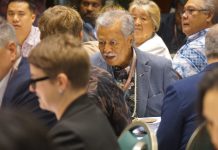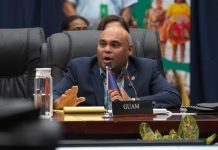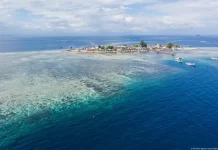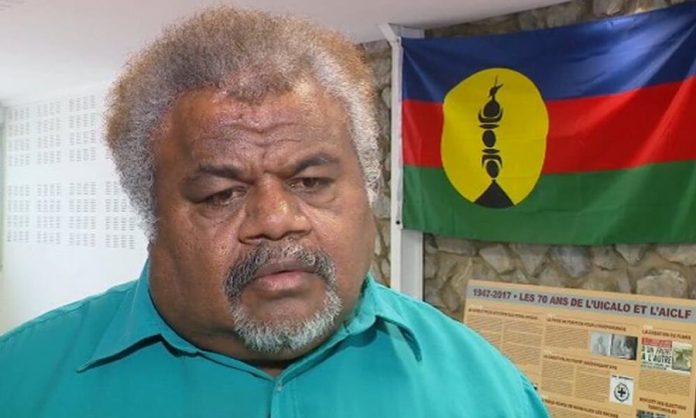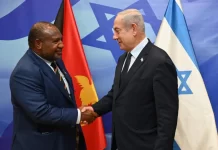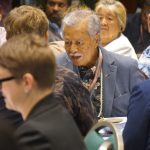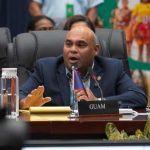By Nic Maclellan in Noumea
A delegation from the Kanak independence movement Front de Libération Nationale Kanak et Socialiste (FLNKS) travels to Paris this week, for discussions with the French government on New Caledonia’s political status.
The delegation, led by the President of New Caledonia’s Congress Roch Wamytan, is scheduled to hold discussions with French Prime Minister Elisabeth Borne and Minister of Interior and Overseas Gerald Darmanin.
However, the planned discussions take place at a time of crisis in Paris, with massive trade union and community protests against French President Emanuel Macron. Over the last month, millions of people across France have rallied against a proposed increase to the retirement age and changes to the pension system. There have been violent clashes between police and protestors in many cities, with mass rallies in the national capital.
Pierre Chanel Tutugoro is secretary general of Union Calédonienne, the largest independence party in New Caledonia. He told Islands Business that the FLNKS delegation would be involved in bilateral discussions with the French state, not formal negotiations to replace the Noumea Accord – the framework agreement first signed in May 1998, which has governed politics and economy in New Caledonia for nearly 25 years.
Tutugoro said the delegation sought French agreement to a new treaty that would map out a timetable for a transition to an independent and sovereign state.
“Our proposed treaty highlights issues related to interdependence with the French State, during a period of transition after independence,” he said. “This will ensure there is no rupture with France. We’re following in the footsteps set by our forebears, seeking independence with full sovereignty, but with ongoing, albeit different, ties with France.”
In contrast, the French government has proposed a timetable to develop a new political status within the French Republic. During last month’s visit to Noumea, Overseas Minister Darmanin flagged the meeting in Paris in coming days, a further ministerial visit to Noumea in May, a possible visit by President Macron to New Caledonia later this year and an agreement finalised by September.
For the French government, this would open the way for reform of the French Constitution in early 2024. The 1998 Noumea Accord is effectively embedded in its own section of the French Constitution, and key provisions can only be changed by referendum or a 3/5 vote in a joint meeting of both the French National Assembly and Senate.
Tutugoro stressed that “while we agree on the need for the first phase of discussions before September, we don’t accept the full timetable proposed by the French State. We’re going to take this step by step. After the first meeting, we’ll assess the outcomes and judge whether it’s worth going ahead with other meetings later this year.”
“We’ve agreed to go to Paris, in the spirit of wanting to move forward – but not necessarily to the same destination!” he said. “We’re going to talk about issues that we want to raise, like the treaty. We need to rebuild confidence, and we hope that bilateral talks will allow this.”
A communique issued by Union Calédonienne President Daniel Goa on 5 April stressed that “at this stage, our representatives will not negotiate anything and no decision taken will be acted on. Beyond this, there will be no tripartite talks [between the FLNKS, French government and anti-independence leaders] as long as our movement’s structures have not studied and chosen the proposals discussed during this Parisian session.”
Anger over failed referendum
Relations with the French government were ruptured after a December 2021 referendum on self-determination – the third in a series of votes under the Noumea Accord. Following an FLNKS call for “non-participation” in the third referendum, independence voters stayed away in droves, halving turnout compared to two previous votes in 2018 and 2020.
The FLNKS and other independence parties are still angered by this failed process, arguing that the “concerned population” – the indigenous Kanak people of New Caledonia – must be involved in any credible self-determination process, in line with United Nations decolonisation principles. Loyalist parties in turn argue the three No votes against independence mean the end of the Noumea Accord process. This gulf highlights fundamental differences over possible changes to New Caledonia’s political status, despite the new talks.
“The France State has a way of looking at the world that’s different to us: they want a new status for New Caledonia within the French Republic,” Tutugoro said. “We look at the situation differently. We say that there was growing support for a Yes vote. This would have been evident if the third referendum was held in December 2022, not 2021. We feel that our independence has been taken from us, and this is a fundamental difference that led to the rupture of dialogue.”
After visits to New Caledonia last year by Minister Darmanin and his delegate minister Jean-François Carenco, followed by further talks in March, the FLNKS has agreed to meet again bilaterally with the French government – though not in tripartite negotiations with the leaders of New Caledonia’s conservative anti-independence parties.
Leaders of the Loyalist bloc have called for reform of the electoral rolls that limit voting for three provincial assemblies and the national Congress to a restricted electorate of New Caledonian citizens. The removal of residency requirements would open the way for up to 40,000 more French nationals to vote in May 2024 provincial elections – changes that are strongly opposed by the FLNKS.
The FLNKS political executive held a meeting in Koohne on 28 March, stating “the FLNKS reaffirms that the electoral roll for New Caledonian citizens remains an irreversible achievement of the Noumea Accord and its modification could undermine social peace.”
Step by step
UC’s Pierre Chanel Tutugoro explained that the talks in Paris are just the first step: “After a period of rupture of dialogue and rupture of trust, the French State has now proposed that a first phase of talks will run for four or five months until September 2023. Then, for the French State, the second phase would run until the May 2024 elections.
“This first phase starts with an initial meeting for discussions – and only discussions. France has proposed topics for discussion: the fixed electoral body, the working groups that they’ve established on topics like nickel and other areas within New Caledonia’s authority, and the May 2024 provincial elections.
“For us, the first phase is interesting, as it corresponds to our timetable. We want to finalise a treaty between our leaders and President Macron by 24 September 2023, the 170th anniversary of French annexation. We’ve agreed to go to Paris, in the spirit of wanting to move forward – but not necessarily to the same destination! We’re going to talk about issues that we want to raise, like the treaty. We need to rebuild confidence, and we hope that bilateral talks will allow this.”
Despite the renewed dialogue, a breakthrough is unlikely this week. Strikes and protests continue across France, and last month, the French President narrowly survived a no confidence motion by just nine votes in the 577-member French National Assembly.
Tutugoro told Islands Business that the current turmoil in the French capital would make it difficult to discuss the complex issues facing New Caledonia, over voting rights, economic change and a new political status.
“I think it will be difficult for the President and Prime Minister to find time to meet, as well as the Minister of Interior, who has many responsibilities at the moment,” he said. “We’ll see how deep the exchanges can be. We need to have access to the highest authorities, but it’s obvious they’re busy with their internal problems. It’s hard to talk with people who are distracted by other issues, so we’ll see what happens in Paris. After that, who knows?”
SOURCE: IB/PACNEWS


